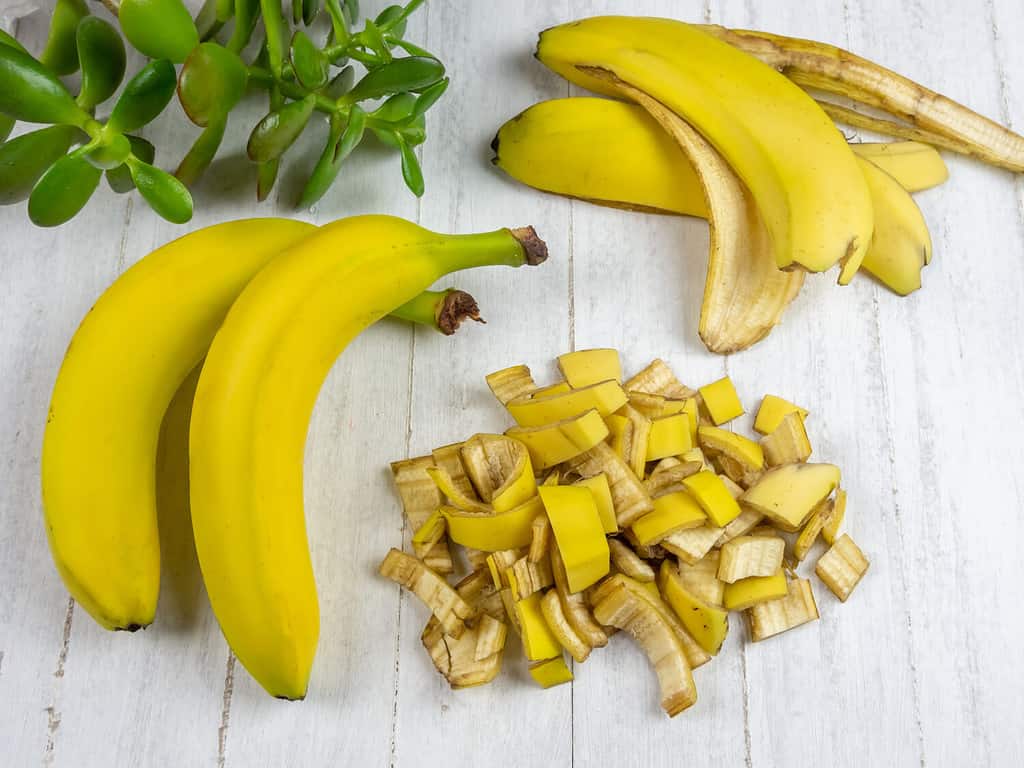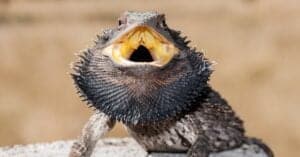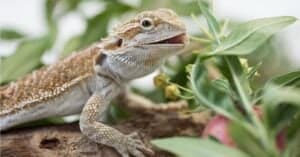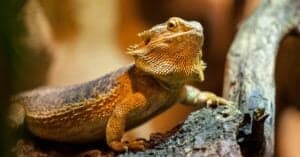Curious about whether your bearded dragon can munch on bananas? You’re not alone! Bearded dragon owners often wonder if this popular fruit is safe for their scaly companions. In this article, we’ll dive into the world of bearded dragon nutrition to find out if bananas make a healthy addition to their diet.
Can Bearded Dragons Eat Banana?
To put it simply, yes, bearded dragons can eat bananas. Just as well, pets like dogs, cats, and horses can also eat bananas safely.
Nutritional Value
Carbohydrates, namely fructose and other naturally occurring sugars, make up the majority of a banana’s weight. They have very little fat and very little protein. While they offer vital minerals like potassium and vitamin C to humans, a bearded dragon’s nutritional demands might not be effectively served by these features of a banana’s nutritional profile.
Bearded Dragons’ Diet
Bearded dragons are omnivores that occasionally eat fruits, leafy greens, and insects in the wild. Their main food sources should be insects like mealworms and crickets, as well as vegetables like bell peppers, kale, and collard greens. This diet gives bearded dragons the vital proteins, vitamins, and minerals they need for health and growth.
Concerns with Bananas
Feeding bananas to bearded dragons should be done in moderation. The high sugar content in bananas can lead to digestive issues and obesity in these reptiles. Additionally, their low protein content does not fulfill the dietary requirements of bearded dragons.
Moderation is Key
If you decide to offer your bearded dragon a small portion of banana, it’s crucial to do so in moderation. Consider it an occasional treat rather than a regular part of their diet. Ensure the banana pieces are small and cut into manageable bites to prevent choking hazards.
Should Certain Parts of the Banana Be Avoided?
Certain parts of a banana should be avoided when feeding a bearded dragon. The peel, for instance, is tough and challenging for them to digest. Bearded dragons have sensitive digestive systems, and consuming banana peels can lead to blockages or discomfort.
Also, the banana’s core, or the tough, fibrous part at the center, should also be removed. This core is harder to chew and may pose a choking hazard. To ensure the safety and well-being of your bearded dragon, it’s best to offer them only the ripe, flesh part of the banana in small, manageable pieces.

Avoid feeding your beardie the peel or inner core of the banana, and also ensure that it is chopped into small, manageable pieces so that your pet can eat it without struggling.
©Natalya_Maisheva/Shutterstock.com
The Benefits of Bananas for Bearded Dragons
Bearded dragons are omnivorous reptiles with diverse dietary needs. While their primary diet consists of insects and leafy greens, offering bananas in moderation can have some benefits for these pets.
Nutrient Diversity
Bananas provide essential nutrients that can complement a bearded dragon’s diet. They contain potassium, which is important for muscle and nerve function, and vitamin C, which can boost their immune system. While these nutrients are not the primary dietary requirements for bearded dragons, they can be a valuable addition when offered occasionally.
Hydration
Bananas have a high water content, which can help maintain hydration in bearded dragons. Adequate hydration is crucial for their overall health, as it supports organ function, digestion, and proper shedding of skin. While bearded dragons primarily obtain water from their diet, a bit of extra moisture from a banana can be beneficial, especially in dry environments.
Variety and Enrichment
Offering a variety of foods, including occasional fruits like bananas, can enrich a bearded dragon’s diet and stimulate their interest in eating. This variety can prevent dietary monotony and encourage them to explore different foods, helping to ensure a balanced nutritional intake.
Positive Bonding Experience
Feeding your bearded dragon small pieces of banana by hand can be a bonding experience. It allows for interaction and trust-building between you and your pet. Just remember to offer bananas as a treat rather than a primary food source.
As mentioned earlier, while bananas can offer some benefits for bearded dragons in terms of nutrient diversity, hydration, variety, and bonding, they should be given sparingly and as part of a well-rounded diet. Always consult with a reptile veterinarian or expert for specific dietary recommendations tailored to your bearded dragon’s needs.
Other Fruits Bearded Dragons Can Eat
There are quite a few other fruits that beardies can enjoy safely in addition to bananas.
Apples
Apples are a great choice for bearded dragons. They are rich in vitamins A and C, promoting eye health and a strong immune system. However, they should be fed sparingly due to their high sugar content.
Berries
Berries like blueberries, strawberries, and raspberries provide antioxidants that help combat free radicals in a bearded dragon’s body. These fruits are also a source of hydration due to their water content.
Papayas
Papayas are loaded with vitamins A, C, and E, making them a nutritious choice. They aid in digestion and contribute to healthy skin, a vital aspect of a bearded dragon’s well-being.
Kiwis
Kiwis are packed with vitamin C, which supports the immune system and overall health. They also offer dietary fiber for digestion, but they should be given in moderation due to their acidity.
Melons
Melons, such as cantaloupe and watermelon, are hydrating and contain vitamins A and C. These fruits are excellent for maintaining proper hydration, especially in warmer climates.
Mangoes
Mangoes provide a significant dose of vitamin A, vital for bearded dragon eye health. However, their high sugar content means they should be an occasional treat.
Papayas
Papayas are a rich source of vitamins A, C, and E, which contribute to healthy skin, good digestion, and a strong immune system.
Benefits of Fruit in Moderation
As mentioned earlier, incorporating fruits into a bearded dragon’s diet in moderation can enhance their nutrition and offer variety, preventing dietary monotony. Fruits also provide hydration, aiding in overall health, and the vitamins they contain support various bodily functions.
But while fruits can be beneficial, overfeeding them can lead to obesity and digestive issues due to their sugar content. Always remove seeds and pits to prevent choking hazards. As individual nutritional requirements may differ, speak with a reptile veterinarian or specialist to ensure a balanced and species-appropriate food for your bearded dragon.
To summarize, bearded dragons will benefit from a varied diet that includes fruits like apples, berries, papayas, kiwis, melons, and mangoes. But to avoid potential health problems, moderation is essential. For their general health and well-being, a balanced diet that consists mostly of insects and leafy greens is still necessary.
Can Bearded Dragons Eat Potatoes?
Bearded dragons can have potatoes only extremely rarely. Potatoes should not be a main staple of your beardie’s diet.
Potatoes, especially the green parts and uncooked potatoes, contain a compound called solanine, which can be toxic to bearded dragons. Solanine can lead to digestive problems, lethargy, and even more severe health issues.
Potatoes are also starchy vegetables with minimal nutritional value for bearded dragons. Their digestive systems are not adapted to process the high starch content found in potatoes. Consuming too much starch can lead to bloating and gastrointestinal distress.
It’s also worth mentioning that potatoes are also firm and can be difficult for bearded dragons to chew and swallow. This poses a risk of choking and potential digestive blockages, which can be life-threatening.
Instead of potatoes, it is best to focus on feeding your bearded dragon a diet rich in leafy greens, vegetables like bell peppers and squash, and appropriate insects like crickets and mealworms. These foods provide the essential nutrients and balanced nutrition needed for their health and growth.
The photo featured at the top of this post is © iStock.com/huettenhoelscher
Thank you for reading! Have some feedback for us? Contact the AZ Animals editorial team.







